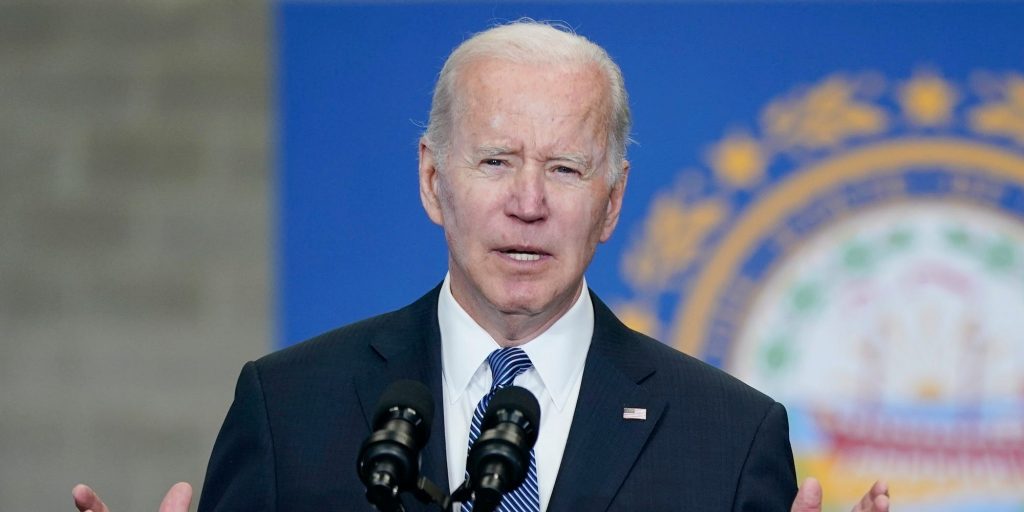- Democrats have run into several blockades in their quest to pass ambitious policy.
- They've hit a wall on issues such as voting rights, abortion, and climate.
- We took a look at Democrats' priorities and evaluated what shot they have at passage.
President Joe Biden and congressional Democrats have checked some big-ticket items off their list before the first half of his term is over.
First, there was the $1.9 trillion coronavirus relief bill, followed by a bipartisan infrastructure bill, and a narrow gun safety bill that nevertheless was supported by Republicans and represented the biggest change to gun laws in 20 years. They confirmed the first Black woman to the Supreme Court, Justice Ketanji Brown Jackson.
But when it comes to the 2022 midterm elections in November, it's what the party hasn't gotten done that's making the most headlines.
Time and time again Democrats have had to contend with the confines of legislating in a 50-50 Senate, weighing various priorities, as well as the prominent divisions between centrists and progressives. In recent months, Democrats are increasingly questioning whether Biden is the right person to deliver on the party's promises.
Time is running out on Democrats who want to deliver before the November midterms. Republicans are widely expected to win the House, which would make policymaking incredibly difficult during the last two years of Biden's term. The GOP also has a shot at winning a majority in the Senate.
But there is still time for Democrats to move ahead. We reviewed each of their big policy items, why they failed, and scored (out of 5) their chance of passage before the midterms:
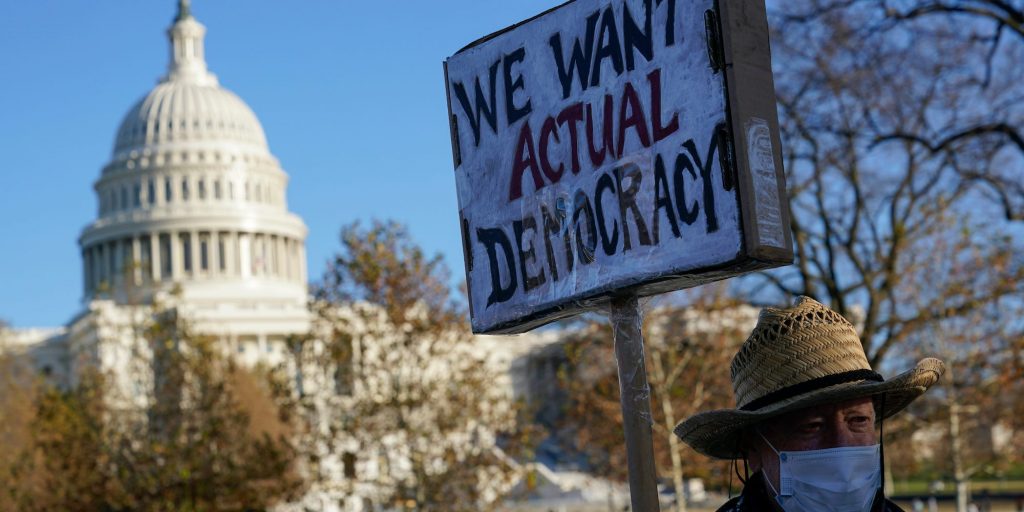
Voting rights & democracy reform:
Biden and congressional Democrats placed passing voting rights legislation as a top agenda item in response to a years-long erosion of the Voting Rights Act at the hands of the Supreme Court, new restrictions tightening voting rights in Republican-controlled states, and President Donald Trump's brazen efforts to overturn his 2020 election loss.
But Democratic leaders' soaring rhetoric came careening against the math of the 50-50 Senate and the reality of the filibuster. Neither of the bills that Senate Democrats proposed, a sweeping voting rights and campaign finance reform bill and legislation to refortify the VRA, garnered firm support from Republicans. Most GOP senators decried the measures as a federal takeover of elections and a Democratic power grab and filibustered voting rights legislation four times in 2021 and 2022.
Biden expressed his frustration with the bills stalling out in a January 2022 speech in which he blasted the Senate as a "shell of its former self," saying the filibuster has been "weaponized" and "abused."
"I've been having these quiet conversations with members of Congress for two months," Biden said. "I'm tired of being quiet!"
After that speech, in which Biden endorsed filibuster reform to pass voting rights legislation, Schumer deployed the last-ditch tactic of calling for a vote on changing the Senate's filibuster rules via the "nuclear option," under which a simple majority of senators can vote to change the chamber's filibuster rules, in January 2022
But two Democrats — Sen. Krysten Sinema of Arizona and Sen. Joe Manchin of West Virginia — have been steadfast in their opposition to scrapping or modifying the filibuster rules, arguing that lowering the threshold to pass Democratic priorities would come back to bite their party when Republicans retake power and exacerbate partisan divisions in the chamber.
The two Democrats joined all 50 Senate Republicans in shooting down Schumer's proposal to change the filibuster rules, striking the final nail in the coffin for Democrats' voting rights push.
Since then, Manchin and GOP Sen. Susan Collins of Maine have been leading a bipartisan group of senators in talks for more narrowly-targeted election reform focused on preventing partisan sabotage of elections, including modernizing and shoring up federal laws governing the counting of electoral votes and the presidential transition process.
But the group has yet to announce an agreement or legislative framework with the clock ticking toward August recess.
Any legislation they do propose would fall far short of the voting rights protections Democrats want. And it could be a heavy lift to get 60 votes in the Senate and pass the House.
Chances of priority passing before the midterms: 1/5
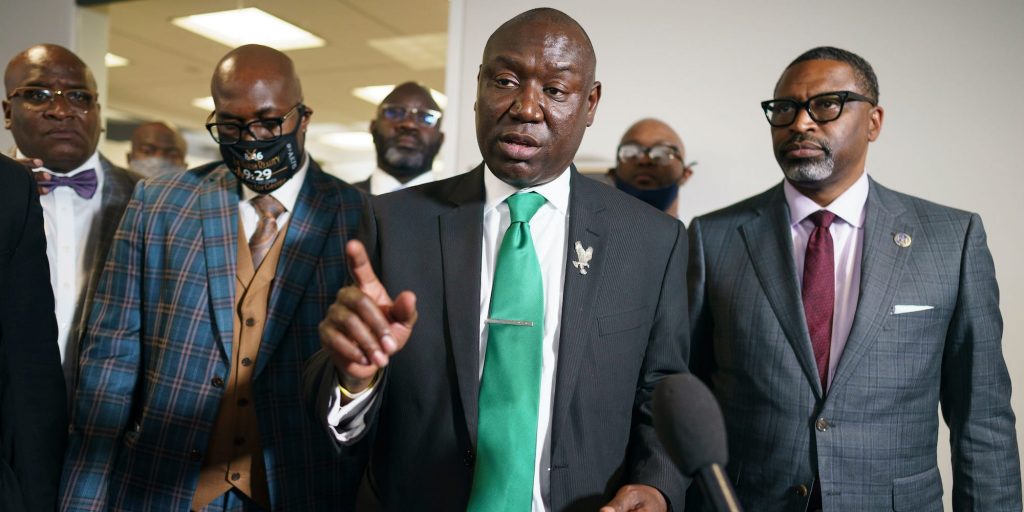
Police reform:
The May 2020 murder of George Floyd and police-inflicted killings of other Black Americans, including Daunte Wright and Breonna Taylor, sparked massive protests around the globe and reinvigorated a push to enhance accountability and overhaul standards for law enforcement at the federal level and in many states and cities.
After taking office, Biden directed Congress to deliver a police reform bill to his desk by May 25, 2021, the one-year anniversary of Floyd's murder.
In June 2020 and again in March 2021, the House passed the George Floyd Justice in Policing Act, a wide-ranging bill sponsored by Democratic Rep. Barbara Lee that would ban chokeholds and no-knock warrants for federal drug cases, require all federal law enforcement officers to wear body cameras, end qualified immunity, impose more federal oversight of police departments, and restrict access to military-grade equipment.
Democratic Sen. Cory Booker and Republican Sen. Tim Scott took point on leading bipartisan negotiations to work out a version of the legislation that could earn 60 votes in the Senate.
But talks officially broke down in September 2021 "after months of exhausting every possible pathway to a bipartisan deal," and securing the backing of major law enforcement unions, Booker said.
The negotiations fell apart when the parties deadlocked over how far to rein in qualified immunity, the controversial legal doctrine that shields law enforcement officials from personal liability for actions they take on the job, including the use of force, that don't violate "established law."
"Unfortunately, even with this law enforcement support and further compromises we offered, there was still too wide a gulf with our negotiating partners and we faced significant obstacles to securing a bipartisan deal," Booker said.
Chances of priority passing before the midterms: 0/5
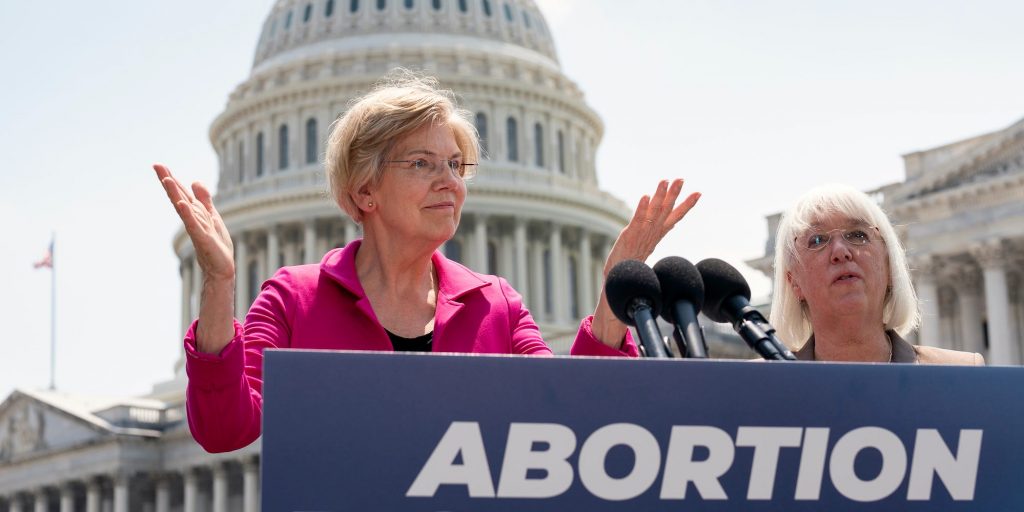
Enshrining abortion rights nationally:
On June 24, the Supreme Court overturned Roe v. Wade, a move that made abortion illegal in some states.
Most congressional Democrats are in favor of a national abortion rights law, and have voted in favor of the Women's Health Protection Act. The bill would make abortion legal in every state and undo most restrictions. It is similar to the abortion rights set out under the now-defunct Roe, though it also allows abortions after viability for undefined "health reasons."
For that reason, Republicans have called it "extreme" and refused to support the legislation. It passed the House but has already failed twice in the Senate this year. Eleven more senators would be needed to pass the legislation under the 60-vote threshold.
Manchin opposes the legislation, saying it goes beyond Roe.
That's why Biden calling for a filibuster carve-out on June 30 is unlikely to be effective. Manchin and Sinema remain staunchly opposed to abolishing the filibuster for any reason.
Even without the filibuster, Democrats lack the 50 votes they would need to pass their bill.
GOP Sens. Lisa Murkowski of Alaska and Collins both support abortion rights but say Democrats' bill has gone too far because it doesn't create moral or religious exemptions. Collins is working on a bipartisan abortion rights bill with Sen. Tim Kaine of Virginia, but one senior Democratic Senate aide told Insider that Democratic women senators and abortion rights groups say privately that they don't see the legislation going anywhere because nine Republicans would need to get onboard, "which everyone knows will never happen right now."
Democrats have stressed that they want to put Republicans on the spot over the issue to draw a contrast between the parties ahead of the November midterms.
Only remote possibilities exist for enshrining abortion rights nationally. One would be for some Republicans to cross over on the filibuster and on the abortion rights bill. Another would be for Democrats and Republicans to compromise on which measures they're willing to support.
One former leader in the reproductive rights movement told Insider that even a limited bill, such as guaranteeing access to abortion in the first trimester, would help 90% of patients seeking to terminate pregnancies. In such a scenario, states would be allowed to raise the gestation floor if they choose.
But both sides remain staunchly divided on the issue, meaning that without a supermajority in the Senate or the abolishment of the filibuster, it could remain in limbo with a patchwork of rules from state to state for years to come.
Chances of priority passing before the midterms: 0/5
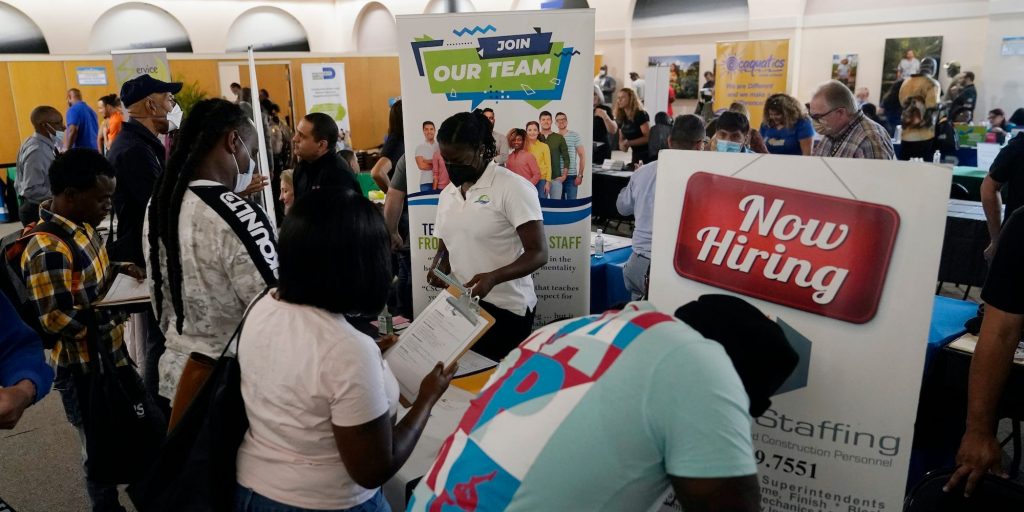
The economy and climate:
The Democratic record on the economy is a mixed one. The party's enormous legislative ambitions to overhaul the American economy and diminish worsening inequality have been undermined by their needle-thin majorities in both chambers of Congress.
Biden campaigned on restoring the economy after it sharply contracted at the onset of the pandemic with mass business closures and a drop in discretionary spending. Taking office, he instilled a sense of urgency as he sought to avoid the kind of drawn-out recovery that plagued past economic crises in the US.
"There is real pain overwhelming the real economy," Biden said as he introduced a COVID-19 rescue plan in January 2021. "The very health of our nation is at stake."
During Biden's time in office, Americans have poured back into the labor market and unemployment has fallen to lows last seen in the late 1960s. In 2021, the economy grew at its fastest pace since the Reagan years.
Some of that progress can be attributed to the $1.9 trillion stimulus law, which provided financial relief to Americans along with state and municipal governments. It also set aside money for vaccine distribution that helped states and cities ease pandemic restrictions. The law passed with unanimous GOP opposition.
However, the stimulus also partly caused another problem that blindsided Biden administration officials. Inflation is now at its highest level since the 1980s, largely the product of Americans with plenty of cash to spend facing supply-chain bottlenecks.
Democrats made limited legislative headway on what they intended to do. Biden secured a $1 trillion infrastructure law with some GOP support, locking in a victory that eluded past Republican and Democratic presidents. It contained $550 billion in new funding to repair roads and bridges, airports, ports and waterways.
Other parts of Biden's economic agenda — including climate initiatives to reduce greenhouse gas emissions and encourage the production of electric vehicles — remain an open question.
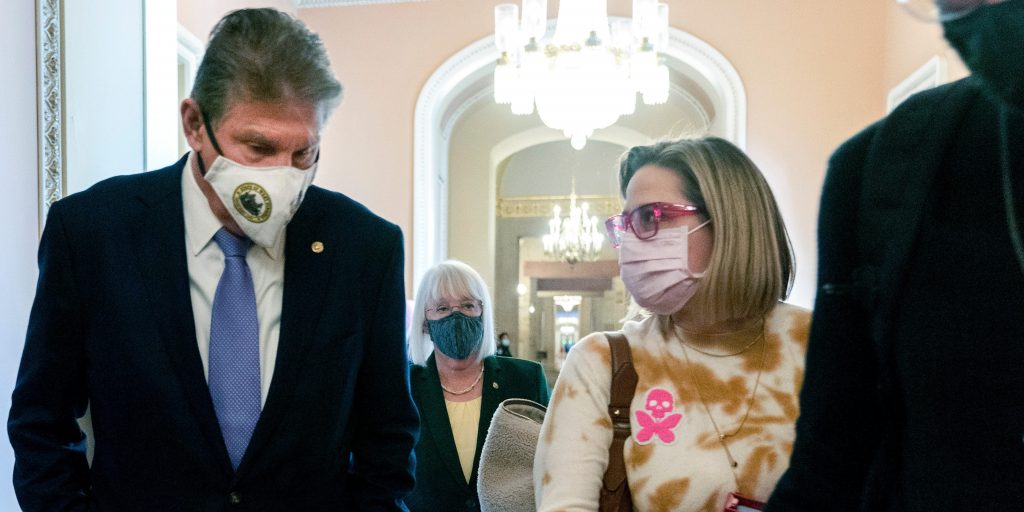
The infrastructure law was originally tied to the passage of a larger social spending and climate bill. Binding the priorities together was intended to keep the small but potent centrist faction in line with progressives. But when Republicans lined up against the larger bill, Democratic leadership decided to settle for the smaller infrastructure-only package, which Biden signed into law in November.
Efforts to advance immigration reform have also floundered. Some Democrats initially viewed setting up a pathway to citizenship for unauthorized immigrants as a way to finance their spending ambitions, arguing it would provide an economic boost. But it was knocked out of the social bill by a Senate official and separate talks with Republicans haven't yielded a breakthrough.
Manchin and Sinema both wielded immense influence over the Democratic agenda in the past year. That allowed them to shrink the size and scope of the original safety-net bill since Democrats couldn't afford to lose their votes in the 50-50 Senate.
The House-approved "Build Back Better" legislation died after Manchin torpedoed it in December. Democrats are poised to take another shot at passing a slimmer energy, climate and tax bill this month. But it won't include many of the initiatives that Biden pressed for, such as establishing a monthly child tax credit for parents, universal pre-K, tuition-free community college, and expanding affordable housing.
Senate Democrats face a serious time-crunch to approve the bill and send it to Biden's desk before the start of the August recess. But they've blown past deadlines before. Democrats have until Sept. 30 to pass it with many elements outstanding as lawmakers begin focusing on campaigning.
Chances of priority passing before the midterms: 2/5
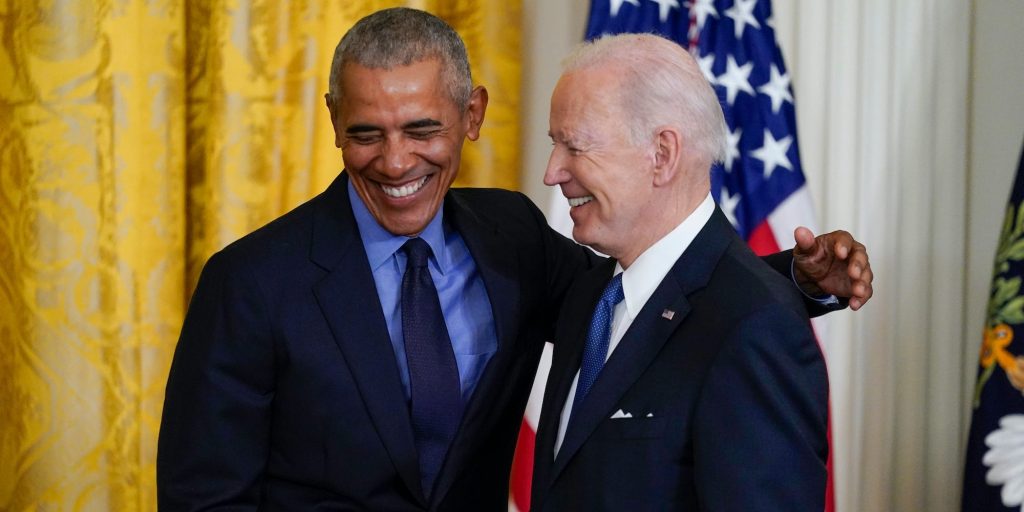
Expanding healthcare coverage:
Biden ran on a promise to expand the Affordable Care Act, more colloquially known as Obamacare, so that more people living in the US could buy health insurance.
Biden and the Democratic-controlled Congress did deliver on that to a small extent. The 2021 American Rescue Plan Biden signed into law poured billions of federal dollars into the private health insurance market. Doing so allowed buyers to get health insurance at a lower price than before the stimulus law, sometimes even at no — or very little — cost to themselves.
But Democrats appear to have largely backed off Biden's promise to create a "public option" for health insurance. Such a system would give people the option to buy a health plan similar to Medicare, rather than going to private insurers.
As for the subsidies, they are limited and set to run out at the end of the year. That means that in the weeks leading up to the election Democrats will face a barrage of stories about soaring health insurance costs. An estimated 13 million people are expected to be affected, according to the Department of Health and Human Services.
Once again, Manchin holds the cards. In June, he signaled to Insider he was open to expanding the Obamacare subsidies but wanted to workshop them so they wouldn't go to wealthy people. Under current law, some people receive more generous subsidies than others depending on their income.
People with middle-class incomes and higher pay no more than 8.5% of their annual income on health insurance they buy through the Obamacare marketplaces, with the federal government picking up the rest of the tab.
Democrats may be able to extend the subsidies or make them permanent alongside their economic policy proposals. Health insurers are pressing lawmakers to get it done, and Democratic leaders have said it's a priority. Manchin has been noncommittal.
Democrats also are in talks about a bill that would allow the federal government to negotiate the prices of some prescription medicines. Doing so would help pay for the health insurance subsidies.
But pharmaceutical companies have been generous to Democrats during recent election cycles and will oppose any attempt to curb their profits. Plus the prescriptions proposal would need to get the agreement of the Senate parliamentarian, Elizabeth MacDonough, to ensure that it fits the rules of reconciliation. If it doesn't, then whether Senators accept it or not becomes moot.
Chances of priority passing before the midterms: 3/5
